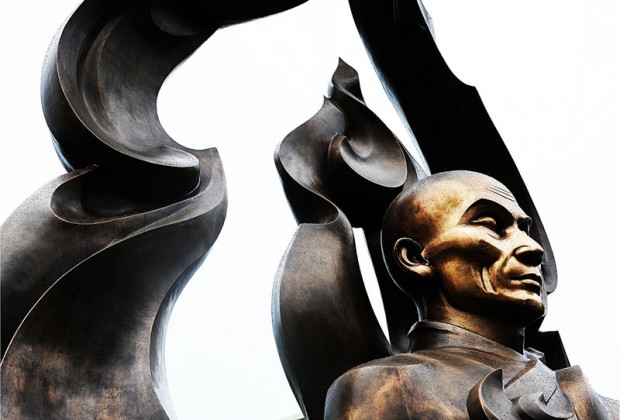Recently, we published an article on ojas – the subtle earth energy in the body that helps one stay grounded, calm, and resistant to disease.
As a quick review, our physical bodies contain a mixture of elements – earth, water, fire, air, and ether. Ayurveda divides these elements into three “doshas” or constitutions, namely: kapha (earth and water), pitta (fire), and vata (air and ether). To stay healthy, and to prevent disease before it starts, we need to keep these elements in balance. If one or more elements in the body or mind become out of balance, health problems, discomfort, and disease can result. Ayurveda is a science that enables and empowers people to become aware of their bodies – noting when the imbalances begin, so that these imbalances can be fixed before they grow and result in disease.
As our physical bodies are composed of the five elements, our subtle bodies (mind, intelligence, and ego) also contain more subtle forms of the five elements. Just as physical illness can result from elements being out of balance, mental distress and discomfort can occur if the subtle elements are out of balance. The subtle body contains ojas (earth/water), tejas (fire), and prana (air/ether).
The focus of this article will be on tejas – the fire within.
Tejas, being likened to fire, has the physical qualities of heat, dryness, and lightness, and the subtle qualities of sharpness and focus. It is related to the eyes and to vision. On a physical level, tejas allows our eyes to digest, or take in, the sites they see and make sense of them. On a more sublte level, tejas allows the intellect the sharpness to digest information it takes in, and to distinguish between truth and falsehood. On an even higher, spiritual level, strong tejas facilitates the ability to discriminate between truth and illusion. Tejas is focused in the muladhara chakra (the first energy center located at the base of the spine). Just as heat rises, tejas energy also rises, moving up the chakras, starting from at the base.
The heating quality in fire pushes us to action. When fire is strong, our determination to act is strong, Weakened tejas on the other hand, results in a loss of determination, and lessened ability to act.
Just as the elements in our physical bodies can get out of balance, so can the elements in our subtle bodies. A person with a healthy amount of tejas will have strong determination, the ability to concentrate, sharp intelligence, and the ability to discriminate. A person with low or weakened tejas on the other hand, may feel lack of energy, inability to concentrate, lack of determination, and lack of ability to discriminate between truth and untruth. A person with excess tejas may feel anger, irritation, and have a critical mind. Such a person becomes overly stuck in their ways, and unable to consider other options or other ways of seeing things.
How does all this information apply practically to our lives? If you can recognize signs of a tejas imbalance within yourself, you can take practical steps to fix this imbalance. If tejas is low, one needs to increase the fire and heat within the subtle body, whereas if it is too high, one needs to reduce the fire and heat. Tejas is increased by heating stimulants and activities such as bright lights, candle gazing, chanting, deep study, heating breathing exercises such as breath of fire, and by contemplation. Tejas is decreased by cooling activities. Tejas is decreased by avoiding controversy and deep, analytic thought, and by taking cooling herbs such as aloe, fennel, mint, and coriander.
To summarize, if you find yourself feeling overly critical, stubborn minded, or angry, you may have too much tejas or fire in your subtle body. If so, try to incorporate calm and cooling practices into your daily routine. Avoid intense study until your tejas comes into balance, eat cooling foods such as cucumber, coconut water, grapes, rice, and milk, perform lunar pranayama (breathing in through the left nostril and out through the right slowly, and for 5 minutes), take cooling herbs as described above, avoid bright lights of the city, and stay away from heated conversations.
If you find yourself feeling weakened in mind, unable to focus, discriminate or concentrate, you might need to increase your tejas or heat in the subtle body. Try practicing breath of fire (short and even exhales and inhales through the nose at a quickened rate – if new at this practice please take instruction from an experienced yoga teacher), or solar pranayama (breathing in through the right nostril and out through the left at a slow pace for five minutes), eat heating foods and spices such as ginger, pepper, tomatoes and yoghurt, and increase analytic study, and candle gazing.
Ultimately, keeping the elements in our minds and bodies balanced through our daily routines, habits, diet, herbs, and lifestyle choices, can be key in preventing diseases before they start. Keeping balanced also helps us to stay healthy, and to live comfortably inside of our bodies – the vehicles we have been given to achieve our purpose on this earth. Be aware of slight imbalances you feel in your body and mind, and work to fix them before they grow into greater imbalances. This is a key aspect of Ayurvedic living.
Hare Krishna, and remember your health is your wealth.






